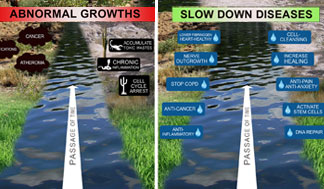GHK Reverses Cortisone Inhibition of Regeneration
The cortisone/cortisol system strongly inhibits tissue regeneration and repair. Elevated cortisone/cortisol have been proposed as accelerators of human ageing. During studies in the late 1980s and early 1990s, we found that GHK-copper 2+ reversed cortisone-induced inhibition of regeneration in rats, mice, and pigs. Cortisone was used to slow healing in animal tests so that the effect of copper complexes could be better studied. Little of this was published but some data exists in a published United States Patent, Number 5,164,367. Below are the results of a typical experiment of cortisone-healing inhibited rats treated with GHK-copper 2+. Dr. H. Paul Ehrlich, a wound healing expert, had suggested this method.
After about year 2000, there rose a general awareness that the cortisone/cortisol system was a possible accelerator of human aging. The cortisone/cortisol concentration increases during aging. DHEA (dehydroepiandrosterone) blocks many negatives effects of cortisone/cortisol but DHEA decreases with time, This allows the negative actions of the cortisone/cortisol system become stronger.
GHK-copper 2+ also decreases during aging, dropping by 60% between age 20 to age 60 in health men. This also may intensify the negative actions of the cortisone/cortisol system.
Important Information on Cortisone / Cortisol & Brain Effects
Cortisone and cortisol are linked to brain problems and dementia. These two very similar molecules are easily converted from one to another.Patients with Alzheimer’s disease have elevated levels of cortisol in their blood streams, compared to healthy patients.
This elevation correlated with the degree of memory impairments that the patients had and appeared early on in the disease progression.
Cortisone injections can cause reversible dementia.
GHK may possibly reduce dementia in humans.
Data from:
| United States Patent | 5,164,367 |
| Pickart | November 17, 1992 |
Method of using copper(II) containing compounds to accelerate wound healing
Methods for the use of compositions of copper(II) containing compounds to accelerate healing of wounds in warm-blooded animals. The methods include systemic loading of copper(II) to accelerate the rate of wound healing following injury or surgery. The copper(II) containing compounds include copper(II) complexes with amino acids and peptides, and copper(II) salts.
Example 11 from patent.
Stimulation of Wound Healing in Healing Impaired Rats by I.M. Injection of Glycyl-Histidyl-Lysine:Copper(II)
Groups of rats had wound chambers implanted as described in Example 10. After implantation of the chambers, the rats were subsequently injected with Cortisone Acetate (10 mg I.M. daily, Cortone Acetate, Merck) to impair the healing response. After allowing for encapsulation of the chambers, the rats were injected I.M. (in the opposite leg from the cortisone injection) with 0.1 ml of either a saline solution containing 10 mg/ml of glycyl-L-histidyl-L-lysine:copper(II) (2:1 molar ratio) or saline. The chambers were harvested and the biochemical parameters of granulation tissue formation examined as described in Example 10.
The I.M. injection of glycyl-L-histidyl-L-lysine:copper(II) in the cortisone treated animals increased the level of all the biochemical parameters examined compared to the level found in the control animals. Moreover, I.M. treatment with the GHK-Cu increased the healing response in the healing impaired animals to the level found in the normal animals. The results of this experiment are presented in Table 2. Ten rats each group.
Cortisone Healing Impaired Rats - GHK-copper vs saline
DRY WEIGHT
mgs/chamber |
PROTEINmgs/chamber |
COLLAGEN mg chamber / gram |
ANGIOGENESIS Units AP/chamber |
|
Saline Control |
20 +/- 12 |
11 +/- 8 |
187 +/- 101 |
0.5 +/-. 0.3 |
Treated with GHK-Cu |
35 +/- 13 |
25 +/- 9 |
366 +/- 74 |
1.5 +/- 0.6 |
REFERENCES
Howes, Edward L., et al. "Retardation of wound healing by cortisone."Surgery 28.2 (1950): 179-181.
Ehrlich, H. PAUL, and THOMAS K. Hunt. "The effects of cortisone and anabolic steroids on the tensile strength of healing wounds." Annals of Surgery 170.2 (1969): 203.
Deuschle, M., et al. "Effects of major depression, aging and gender upon calculated diurnal free plasma cortisol concentrations: a re-evaluation study."Stress 2.4 (1998): 281-287.
Swaab, D. F., et al. "Increased cortisol levels in aging and Alzheimer's disease in postmortem cerebrospinal fluid." Journal of neuroendocrinology6.6 (1994): 681-687
Lupien, Sonia J., et al. "Cortisol levels during human aging predict hippocampal atrophy and memory deficits." Nature neuroscience 1.1 (1998): 69-73.
Seeman, Teresa E., et al. "Increase in Urinary Cortisol Excretion and Memory Declines: MacArthur Studies of Successful Aging 1." The Journal of Clinical Endocrinology & Metabolism 82.8 (1997): 2458-2465.
Lupien, S. J., et al. "Increased cortisol levels and impaired cognition in human aging: implication for depression and dementia in later life." Reviews in the Neurosciences 10.2 (1999): 117-140.
Sean F. Kelley, Arthur M. Felix, H. Paul Ehrlich The Antagonism of Glucocorticoid Inhibition of Wound Healing in Rats by Growth Hormone-Releasing Factordoi: 10.3181/00379727-194-43098 Exp Biol Med (Maywood) September 1990 vol. 194 no. 4 320-326.
Ehrlich, H. Paul, Hunt, Thomas K. Effects of Cortisone and Vitamin A on Wound Healing. Annals of Surgery, Volume 167: 324-328, 1968.














